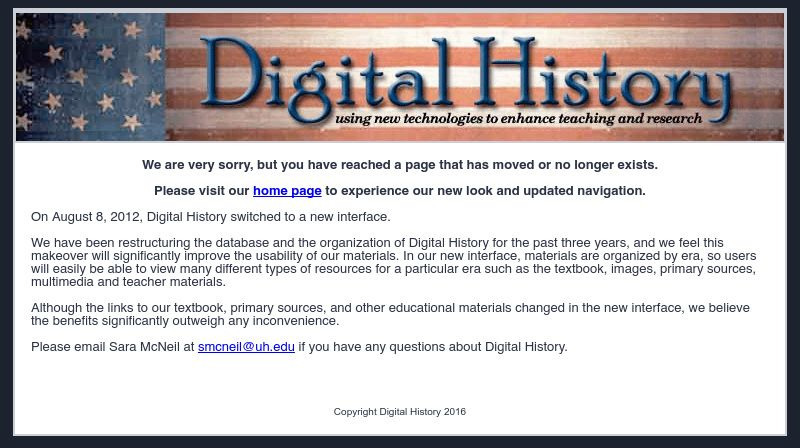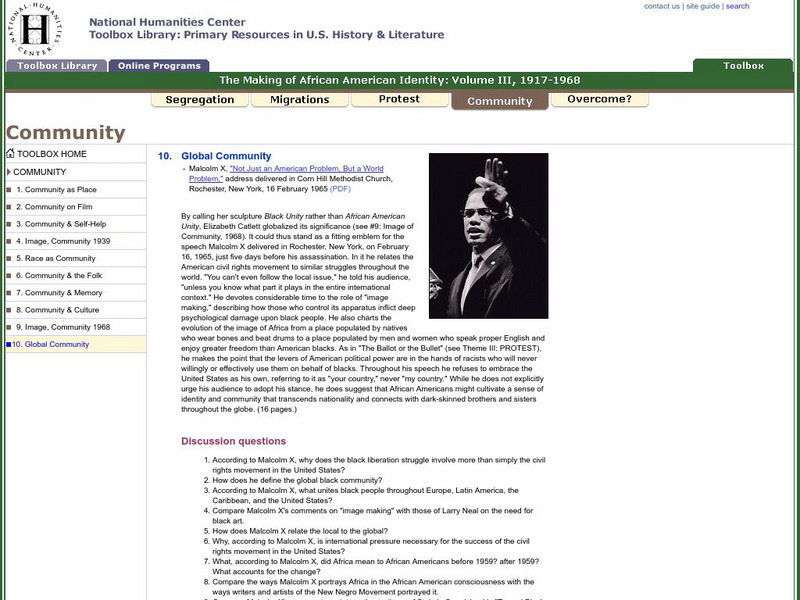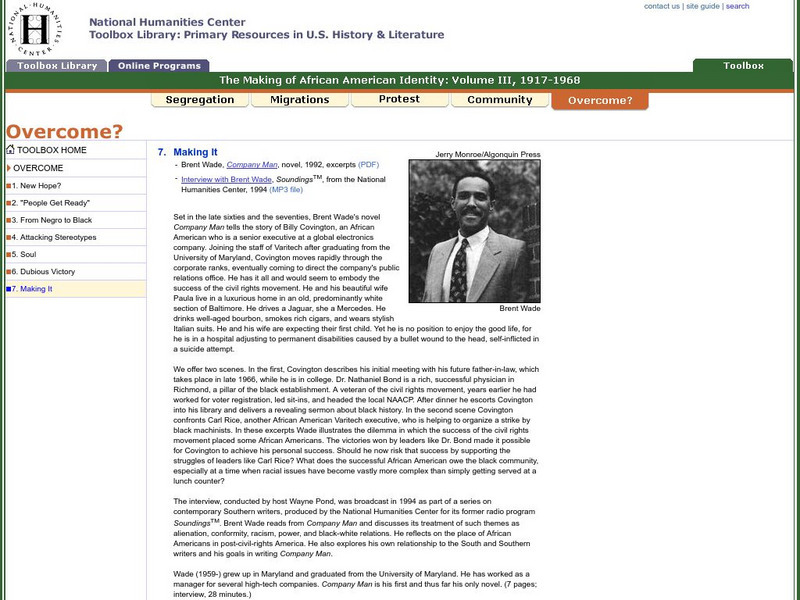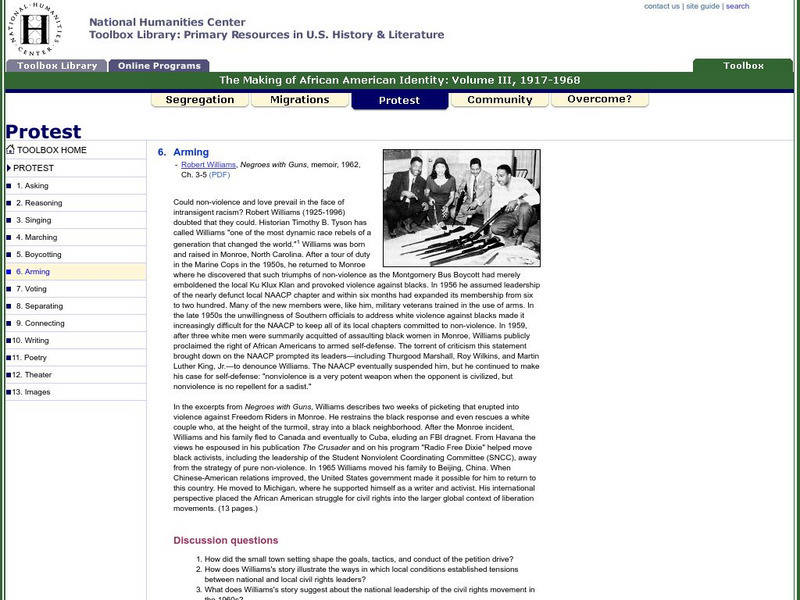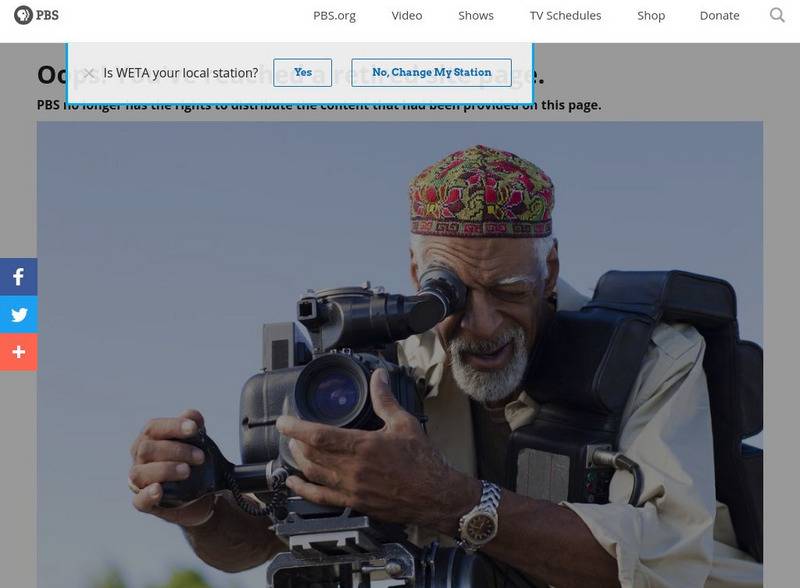The Newberry Library
Newberry Library: The Struggle for Civil Rights in the Urban North
Learning resource using primary sources in which students study de facto segregation in the North following the Civil War and examine how African-Americans responded to segregation and racism compared to the South.
Digital History
Digital History: Black Nationalism and Black Power
There were two methods of protesting discrimination of African Americans during the Civil Rights Movement: follow Martin Luther King, Jr. or Malcolm X. Find out about the Black Panther Party, Black Nationalism, and Black Power.
TED Talks
Ted: Ted Ed: Martin Luther King, Jr.: "I Have a Dream"
On August 28, 1963, Dr. Martin Luther King, Jr. delivered a speech to hundreds of thousands of Americans at what is known as the March on Washington. This now-famous speech was both an apex and catalyst for the Civil Rights Movement in...
My Hero Project
My Hero: Ruby Bridges
Chosen as a Freedom Hero, Ruby Bridges faced the incredible task of integrating an elementary school during the Civil Rights Movement.
Other
National Civil Rights Museum
Get a glimpse of what is housed in the National Civil Rights Museum in Memphis, Tennessee. The interactive tour highlights the struggle and introduces key historical figures such as Sojourner Truth, Nat Turner, Dred Scott, and Frederick...
PBS
Pbs Learning Media: Primary Source Set: The Black Power Movement
This collection uses primary sources to explore the Black Power Movement.
PBS
Pbs: American Experience: The Murder of Emmett Till
The murder of Emmett Till was a major catalyzing event in the Civil Rights Movement. Here you will find extensive information on the murder, trial, and the ramifications of both.
National Humanities Center
National Humanities Center: Toolbox Library: Global Community, Making of African American Identity: V. 3
On February 16, 1965, in Rochester, New York, Malcolm X delivered a speech that placed African American in a global black community. Just five days before his assassination, he relates the American civil rights movement to similar...
Other
Freshman Academy: New Approaches to Civil Rights [Pdf]
This section from an American History book covers the extension of the application of civil rights that were legislated in the 1960s. Read about busing, affirmative action, disability rights movement, and the Native American protest...
TED Talks
Ted: Ted Ed: Stories: Legacies of Who We Are
Storyteller and educator Awele Makeba combines performing arts and history to tell a powerful story from the American Civil Rights Movement. Free registration is required for full access to the lesson.
HotChalk
Hot Chalk: Lesson Plans Page: The Civil Rights Movement (A Web Project)
This comprehensive lesson plan has students thoroughly researching and creating a Civil Rights Movement project.
Ducksters
Ducksters: Civil Rights for Kids: Timeline of African American Civil Rights
Learn about the timeline of the history African-American Civil Rights in the United States from the Emancipation Proclamation to the March on Washington to Barack Obama becoming president on this website.
National Humanities Center
National Humanities Center: Toolbox Library: Making It, Making of African American Identity: V. 3
Excerpts from a novel and an interview that illustrate where the success of the civil rights movement left some middle class African Americans. They explore the obstacles the civil rights movement had to overcome and the movement's...
National Humanities Center
National Humanities Center: Toolbox Library: Making of African American Identity: Volume Iii: Community
Series of 10 primary resources explores African American identity from 1917 to 1968, examining the changing notions of identity and affects on the definition of African American community.
Library of Congress
Loc: African American Sites in the Digital Collections
American Memory, online exhibits and other areas of the Library's Web site provide a broad range of digitized materials pertaining to the African American experience.
Virginia Historical Society
Virginia Historical Society: Conclusion: Did the Civil War End at Appomattox?
While the American Civil War officially ended at the Battle of Appomattox, Confederate sensibilities ran deep and it was not until the Civil Rights Movement in the 1950s and 1960s that blacks were able to fully assert their equality....
Other
People's World: The Chicago Freedom Movement: Summer of 1966
An informative and inspiring article about the African American struggle for civil rights in Chicago, 1966. The authors offer a first-hand account of protests against unfair housing and discrimination and the subsequent changes made.
National Humanities Center
National Humanities Center: Toolbox Library: Arming, Making of African American Identity: V. 3
This resource offers a memoir that examines the role of armed self-defense in the civil rights movement. An excerpt from the text "Negroes with Guns", by Robert Williams is made available here, describing his approach towards civil...
Annenberg Foundation
Annenberg Learner: American Passages: Becoming Visible: James Baldwin
James Baldwin is presented in this biography as a great African American contributor to the literary world during the civil rights movement. See "James Baldwin Activities" for more information.
Khan Academy
Khan Academy: Us History: 1945 1980:civil Rights Act 1964/voting Rights Act 1965
Learn about the civil rights legislation that outlawed discrimination in jobs, education, housing, public accommodations, and voting.
PBS
Pbs: American g.i. Forum: Hector P. Garcia
Part of the website associated with the PBS series called "The Border." This article discusses the role of Hector Garcia in the Hispanic civil rights movement after World War II.
National Geographic
National Geographic: The Impact of the Jfk Assassination on American Politics
Students investigate the impact John F. Kennedy's assassination has had on American politics since that event. After his death, Lyndon B. Johnson pushed through the Civil Rights Act of 1964 and the Voting Rights Act, both of which had...
Annenberg Foundation
Annenberg Learner: America's History in the Making: Egalitarian America
Comprehensive teaching unit on egalitarian America: Americans that demanded political, social, and economic equality in all walks of life. Learn how the civil rights movement and an expanding mass media helped to reshape a changing...
Center For Civic Education
Center for Civic Education: Black History Month
A collection of six lessons for Grades 5 and up for Black History Month. The lesson plans explore the use of nonviolence in history, particularly with respect to the civil rights movement and African American history.

